Between school, work, preparing for a trip to the west coast, and trying to gather and read the books for next week’s installment of Overdue Books, I’ve got no reviews or relevant comic book commentary today. Sorry. In the interest of living up to the title "The Daily Burn," I’m about to bitch about my life. Sorry again.
As I mentioned two weeks ago, I met a frustrating road bump in my academic life recently. Actually, no. Not a road bump. It’s more like I realized I wasn’t driving in the wrong direction, but was going two hours out of my way for no reason. This is my third semester back in college, and I was only just informed that I was not responsible for certain General Education requirements (e.g., Foreign language, Math, Information literacy, cross-cultural studies, etc.). My school’s current Gen Ed policy came into effect in 2000, and it was decided that students who earned any credits at any school before 2000 were excused from those requirements. I attended a universty in Florida between 95 and 97. In the meantime, I have either completed or am in the progress of completing a total of 18 credits since attending my new school specifically to fulfill the Gen Ed stuff. It may not seem like a lot perhaps, until you consider that I took 15 credits last Fall, that was the largest number of credits I took in a single semester since returning to school, I've been here for 3 semesters, meaning that - in terms of time, work, etc. - completing these unnecessary classes represent more than a semester’s worth of work. It’s as if you took an entire semester’s worth of my work, balled it up, tossed it over your shoulder, and gave me the finger.
Twelve of those credits aren’t worth worrying about. They’re done, they gave me two A’s and a B, so no big deal. I’m taking the other six this semester. Two classes: World Cities and History of England. If I withdraw, no more financial aid. Instead, I petitioned the Dean of Undergraduate Studies to waive the deadline of declaring classes pass/fail on the basis that the officious bastards never informed me that I didn’t need the classes I signed up for (for those unfamiliar with the stupidity that is university bureaucracy, “pass/fail” means that you get credit for taking a class but it neither helps nor hurts you overall Grade Point Average, and you usually only have a certain amount of time - often within the first few weeks of the semester - to declare a class or classes pass/fail) . In order to even have the petition considered, I needed signatures from each professor attesting to the fact that I’m still going to class (which I am).
The World Cities professor was no problem. World Cities is a big 200+ lecture course, the professor was notably busy when I visited him, so I figure he would’ve signed anything I handed him just to get me out of his hair.
The history professor was a bit trickier.
Just to skip the foreplay, yes, he did sign it. But he made me pay for it. For a half hour, he looked at the sheet I wanted him to sign, sighed, read the letter addressed to the Dean, sighed, flipped through my degree audit (which was attached to the sheet in order to prove that I had been mislead as to my Gen Ed requirements), sighed some more, and just fucking refused to fucking get it. It was like asking my parents to borrow money. I know they’re going to fork it over, but not before a good lecture.
“I don’t understand.”
“You’re not going to get less than a B, anyway.”
“I think this is a mistake.”
“I don’t understand. You have a good GPA.”
Yeah, and I’d like to fucking keep it. I mean, hey, if I had a 2.1 GPA, I’d understand what he was saying, because what’ve you got to lose at that point? You might as well step up to the plate and try to do what you can to make your diploma more meaningful than toilet paper.
I think more because of my girlfriend’s accounts of the downside of teaching than anything else, I understand the guy’s problem. If you stand in front of a bunch of strangers, talking about something that you have devoted your professional life to (and probably a good deal of your free time), you want to feel like those strangers are listening. And maybe you’re worried that someone trying to take the class pass-fail just wants to skim through without doing anything.
But at the same time, I’m there every day. I’m one of the more vocal students in the class. I get the distinct feeling that, even now after he signed the paper, I’m one of a small number of students who actually reads the required texts. If I was the guy who always comes in ten minutes late and never speaks, I’d say he had valid concerns. But that ain’t me. I don’t care whether I signed on to the course because it was a requirement or because I thought it would change my life. If I’m there, I’m fucking THERE. I don’t have enough time to spend what little I have twiddling my thumbs and staring at the ceiling.
Here’s the thing. Here’s the big, BIG thing that scares me.
Last semester, using my Marxist Theory paper on Batman to do so (hey, who said this post wasn’t comic book-related), I got into the English Honors program. In order to stay in the program, I need to maintain a 3.25 overall GPA, and a 3.5 GPA in my English courses. Right now, my overall is 3.76, my English is 3.85. So, I’m not in any imminent danger.
I didn’t apply to the program to impress potential employers, impress other English students, or beef up my chances of grad school acceptance.
I did it because as a member of the Honors program, I have the opportunity to work on a thesis project in my senior year (9/06-5/07). I’m also allowed the option of a creative thesis (i.e., writing short stories, poems, screenplays, a novella, etc.).
I think I won’t be overgeneralizing when I say that for anyone who’s a creative writer and in an undergraduate program - with the exception of those who are lucky enough to be in a creative writing program (I was a Writing major in my old school, but it’s not offered as a major in my current one) - the most frustrating things are the amount of material you have to read and write, how little of it is anything you want to read and write, and how little time it affords you to work on your own stuff. I can’t express how maddening it is to have to forcibly shove the excitement I feel towards a new idea for a short story, poem, or an essay for the blog or CBG because I have a paper to write on the rise and fall of the Iron Age Kingdom of Meroe.
As an unpublished writer who doesn’t want to remain unpublished, the opportunity to have an entire year to finally develop my own creative writing project for college credit, and to essentially have people who are paid to give me constructive feedback on my work, is a gift from Zeus. I can’t put a price on that. It will probably be the single most relevant project I’ll work on in college, and I can’t imagine that anyone would think that it’s okay to threaten the loss of that opportunity because I remembered a few less facts than I should have about the fucking Battle of Agincourt. Fuck the Battle of Agincourt. French people fought English people. What a startling fucking milestone.
Thursday, October 27, 2005
Wednesday, October 26, 2005
The Daily Burn's 100th Post
Because of pressures from both work and school, I’d been planning on posting that there would be no updates today.
I guess I never noticed until today that when you sign on to blogger, it tells you how many times you’ve posted to your blog. My number was 99, and I sure as hell wasn’t going to let my 100th post be of the “sorry, no updates” sort.
Ironically, reminded by Johnny Baccardi’s announcement of his blog’s third anniversary, I’d just been thinking about how I’d never kept track of anything like that with the Burn.
In honor of my 100th post, I’m going to put aside some of my other responsibilities to share my thoughts on an archetype that’s somewhat obscure and too often forgotten in discussions of sequential art.
Superheroes.
I left comics for a while in my late teens as I became more interested in rock, inebriation, and talking to people who weren’t asking me to roll for a saving throw vs. poison. My early to mid-twenties were turbulent. I hopped from place to place, not so much trying to find myself as running away, and eventually ended up in San Diego trying to build a new life. My new life was aborted with a phone call from my mother who had just found out she had a terminal illness.
I returned to Albany and got a data entry job at a hospital. I don’t think I’ll ever be as skilled a writer as I would need to be to articulate how the combination of my mother’s illness, a job where I was often required to devour reports from every department in the hospital regarding how each and every mortality had become a mortality rather than a discharge, and the events of 9/11 served to make death such an overwhelming and inescapable part of my thoughts. Every cough was cancer. Every lump was a tumor.
A week after the Twin Towers came down, a series of violent sleep disturbances began. In my sleep I would throw myself into walls and floors. Once I grabbed a filing cabinet and tossed it across the room. Another time I woke up to find my hand inches away from the knob of my apartment’s front door.
I still have to be careful about what films and TV shows I watch. A few weeks ago, my girlfriend and I got in a bit of a tiff during a conversation about whether or not to see March of The Penguins. She pointed out she’d heard there were scenes of penguins being killed, and I yelled at her when she tried to describe one of them. A particularly gory scene at the end of Shaun of The Dead ruined the entire film for me. Apparently for its cultural significance in regards to the treatment of women in Japanese culture, my World Cities professor had us watch Audition. I won’t “ruin” it for anyone who hasn’t seen it, but suffice to say a scene towards the end of the film is particularly painful to watch. I was furious at my professor, and my anger for him was muted only my disdain for the sadistic motherfuckers in the class who were laughing through the entire scene.
Every now and then various scenes from movies and tv flash in my mind, sometimes lingering for a bit. In many cases, I couldn’t even tell you the name of the program or film.
A single mother shot in the head in a dark room. She falls down hard, knocking her screaming toddler as she does. A family awaking tied and gagged by home invaders. The criminals promise the father they’ll rape and kill his wife and daughter before he sees the end. A black soldier at the Alamo instantaneously run through by a half-dozen bayonets. A wandering cheetah finds the home of a female. He sniffs around for a few minutes, finds the entrance, disappears into the hole and re-emerges with the limp body of a cheetah cub in his jaws. The narrator explains it's so the female cheetah will go back into heat. Two young boys in the ghetto fight. One cuts the head off a pigeon and flicks it at the other before running away. A robber holds up a convenient store and slices off an old woman’s finger because it’s too thick for him to get at her ring. A teenage girl held in the air by an invisible killer, bled out in front of her younger brother. A horde of vampires swarming on a young boy, holding him on his side and feeding on him like a long cob of corn.
One image in particular stays with me, and probably will until I go the way of Blue Beetle and Jarella (they’re dead). It was a nature show. A pack of hyenas runs into a pride of lions. They fight over a carcass. The hyenas get the worst of it. In the melee, one of the younger lions manages to capture a baby hyena. It hangs from the lion’s mouth, crying out in fear. Bleeding and limping, the rest of the hyenas turn and leave the baby to its fate. The narrator mentions that the lions' kill rate must have dropped if they’re willing to eat a hyena.
How can anything meet its end that way? How can that be allowed? Death, if it has to come, should come in our sleep. Our minds should be too quiet to notice the jump from one dream to another. How can something be eaten alive, its final memory the hot breath of strange, alien bastards? How can our ends come so swiftly, without the kind of solemn celebration any shitty movie death scene gets? Why does Captain Kirk get a dignified end and I don’t? How can someone slam me into a building, rape me to death, spear me with knives, blow out my brains, and leave everything I was and am and longed to be reduced to a brief, twitchy moment of fear and blood? What fucking forbidden produce did our ancestors eat that the Powers That Be allow everything that is beautiful and hopeful in each of us to end in a stupid, senseless act of predator and prey? Our lives should end with music, poignant last words, final kisses and confessions or at least silence; not with grunts, kicks, screams and gore. There are hellhounds on our trail.
Teaches us our mortality, that’s how nature works, appreciate what you have while you have it, there is no spoon, be the ball, with great power comes great blah blah blah BULLSHIT. There is something wrong with this. There’s no one for Vincent D’Onofrio to sniff out on Law & Order. No one to hang at Nuremberg. But you know it in your bones. There’s something wrong with this. This shouldn’t be allowed.
And superheroes DON’T allow it.
A lot of the critical attention devoted to superheroes focuses on them as being a purely American phenomenon, eventually exported to the rest of the world. The few academics interested in studying the world of the super write about sexual repression, the death of the father figure and the orphan fantasy, political agendas, the juvenile male appeal, the objectification of women, different societal factors that lead to the birth of the 20th century superhero, etc.
All of these things are important and I’ve written about some of them myself (none of it’s been published, obviously), but the critics rarely go beyond the narrow scope of the present to find the roots of the superhero. The superhero is older than America. It’s as old as the Bible, if not older. Samson, Heracles, Achilles, and Beowulf - what would you call these people today? In fact, while I run the risk of offending any Christian readers (and that is certainly not my intent), while some might consider a comparison between Jesus Christ and contemporary superheroes as ridiculous or insulting . . . guy with supernatural abilities who wants to save the world. What do you call someone like that in 2005?
Superheroes, for me, are the agents of a better God, waging a beautiful and absolutely futile war with the inevitable. They’re stupid strongmen breaking the jaws of death. To say they “defy death” isn’t enough. It implies they defy their own deaths, whereas they defy the very concept, rendering them both angelic and Luciferean. Like their mythic ancestors, they are wonderfully impossible.
And the latter has at least something to do with their enduring appeal, doesn’t it? While I know the Comics Code probably had more to do with the supremacy of superhero comics over other genres than anything else, isn’t it reasonable to assume that part of their appeal can be explained by the fact that - unlike just about every other example of male-oriented adventure comic book fiction - superheroes live in a world of absolute impossibility? As romanticized as comics about pirates, swordsmen, cops, robbers, cowboys, spies, space travelers, and private detectives have always been, they are all - at least in part - based on people who did or do exist. On the other hand, there has never been nor will there ever be anyone remotely like a superhero (and no, those English “Father’s rights” guys who dress up like Spider-Man and straddle London Bridge don’t count).
That’s why comics claiming to portray what superheroes would “really” be like don’t carry much weight with me. It’s a stupid, worthless endeavor. Superheroes have never been real and never will be. It’s ridiculous to bind them with real world rules. You might as well have an Identity Crisis for the Snorks or the Care Bears.
And darker, bloodier superhero comics have nothing to do with realism. If you disagree, pick up a few Savage Dragon trades, note the body count, and tell me whether or not you think it’s a pinnacle of realism.
I’m not interested in realism. I’m not interested in yet one more examination of the superhero as a tyrannical figure. I’m not interested in fabricating scientific or sociological justifications for the existence of characters who do not and could not exist. I’m not interested in nostalgic snark that serves only to take bad, tired jokes and disguise them as depth. And I couldn’t give a good goddamn about whether or not Spider-Man can beat up Firelord.
There is more that the superhero can do. None of us are seeing it because the people at the reins are safe bastards. I don’t disagree with the bloggers and critics who want the superhero supremacy of the comics industry to disintegrate. Nor do I disagree that nothing compelling is going on in the superhero comic book world. But admitting that superhero comics are stagnant and that more diversity is needed in America’s comic industry does not mean the superhero should fade away.
My superheroes are life unbound. My superheroes are capable of beauty and depth. My superheroes are on the trail of the hellhounds. My superheroes are futile soldiers in a battle against the end of the day.
If you’d like, forget everything I’ve written here. It can all be summed up by the perfect words that opened the first issue of Kurt Busiek’s Astro City.
In my dreams, I fly.
I guess I never noticed until today that when you sign on to blogger, it tells you how many times you’ve posted to your blog. My number was 99, and I sure as hell wasn’t going to let my 100th post be of the “sorry, no updates” sort.
Ironically, reminded by Johnny Baccardi’s announcement of his blog’s third anniversary, I’d just been thinking about how I’d never kept track of anything like that with the Burn.
In honor of my 100th post, I’m going to put aside some of my other responsibilities to share my thoughts on an archetype that’s somewhat obscure and too often forgotten in discussions of sequential art.
Superheroes.
I left comics for a while in my late teens as I became more interested in rock, inebriation, and talking to people who weren’t asking me to roll for a saving throw vs. poison. My early to mid-twenties were turbulent. I hopped from place to place, not so much trying to find myself as running away, and eventually ended up in San Diego trying to build a new life. My new life was aborted with a phone call from my mother who had just found out she had a terminal illness.
I returned to Albany and got a data entry job at a hospital. I don’t think I’ll ever be as skilled a writer as I would need to be to articulate how the combination of my mother’s illness, a job where I was often required to devour reports from every department in the hospital regarding how each and every mortality had become a mortality rather than a discharge, and the events of 9/11 served to make death such an overwhelming and inescapable part of my thoughts. Every cough was cancer. Every lump was a tumor.
A week after the Twin Towers came down, a series of violent sleep disturbances began. In my sleep I would throw myself into walls and floors. Once I grabbed a filing cabinet and tossed it across the room. Another time I woke up to find my hand inches away from the knob of my apartment’s front door.
I still have to be careful about what films and TV shows I watch. A few weeks ago, my girlfriend and I got in a bit of a tiff during a conversation about whether or not to see March of The Penguins. She pointed out she’d heard there were scenes of penguins being killed, and I yelled at her when she tried to describe one of them. A particularly gory scene at the end of Shaun of The Dead ruined the entire film for me. Apparently for its cultural significance in regards to the treatment of women in Japanese culture, my World Cities professor had us watch Audition. I won’t “ruin” it for anyone who hasn’t seen it, but suffice to say a scene towards the end of the film is particularly painful to watch. I was furious at my professor, and my anger for him was muted only my disdain for the sadistic motherfuckers in the class who were laughing through the entire scene.
Every now and then various scenes from movies and tv flash in my mind, sometimes lingering for a bit. In many cases, I couldn’t even tell you the name of the program or film.
A single mother shot in the head in a dark room. She falls down hard, knocking her screaming toddler as she does. A family awaking tied and gagged by home invaders. The criminals promise the father they’ll rape and kill his wife and daughter before he sees the end. A black soldier at the Alamo instantaneously run through by a half-dozen bayonets. A wandering cheetah finds the home of a female. He sniffs around for a few minutes, finds the entrance, disappears into the hole and re-emerges with the limp body of a cheetah cub in his jaws. The narrator explains it's so the female cheetah will go back into heat. Two young boys in the ghetto fight. One cuts the head off a pigeon and flicks it at the other before running away. A robber holds up a convenient store and slices off an old woman’s finger because it’s too thick for him to get at her ring. A teenage girl held in the air by an invisible killer, bled out in front of her younger brother. A horde of vampires swarming on a young boy, holding him on his side and feeding on him like a long cob of corn.
One image in particular stays with me, and probably will until I go the way of Blue Beetle and Jarella (they’re dead). It was a nature show. A pack of hyenas runs into a pride of lions. They fight over a carcass. The hyenas get the worst of it. In the melee, one of the younger lions manages to capture a baby hyena. It hangs from the lion’s mouth, crying out in fear. Bleeding and limping, the rest of the hyenas turn and leave the baby to its fate. The narrator mentions that the lions' kill rate must have dropped if they’re willing to eat a hyena.
How can anything meet its end that way? How can that be allowed? Death, if it has to come, should come in our sleep. Our minds should be too quiet to notice the jump from one dream to another. How can something be eaten alive, its final memory the hot breath of strange, alien bastards? How can our ends come so swiftly, without the kind of solemn celebration any shitty movie death scene gets? Why does Captain Kirk get a dignified end and I don’t? How can someone slam me into a building, rape me to death, spear me with knives, blow out my brains, and leave everything I was and am and longed to be reduced to a brief, twitchy moment of fear and blood? What fucking forbidden produce did our ancestors eat that the Powers That Be allow everything that is beautiful and hopeful in each of us to end in a stupid, senseless act of predator and prey? Our lives should end with music, poignant last words, final kisses and confessions or at least silence; not with grunts, kicks, screams and gore. There are hellhounds on our trail.
Teaches us our mortality, that’s how nature works, appreciate what you have while you have it, there is no spoon, be the ball, with great power comes great blah blah blah BULLSHIT. There is something wrong with this. There’s no one for Vincent D’Onofrio to sniff out on Law & Order. No one to hang at Nuremberg. But you know it in your bones. There’s something wrong with this. This shouldn’t be allowed.
And superheroes DON’T allow it.
A lot of the critical attention devoted to superheroes focuses on them as being a purely American phenomenon, eventually exported to the rest of the world. The few academics interested in studying the world of the super write about sexual repression, the death of the father figure and the orphan fantasy, political agendas, the juvenile male appeal, the objectification of women, different societal factors that lead to the birth of the 20th century superhero, etc.
All of these things are important and I’ve written about some of them myself (none of it’s been published, obviously), but the critics rarely go beyond the narrow scope of the present to find the roots of the superhero. The superhero is older than America. It’s as old as the Bible, if not older. Samson, Heracles, Achilles, and Beowulf - what would you call these people today? In fact, while I run the risk of offending any Christian readers (and that is certainly not my intent), while some might consider a comparison between Jesus Christ and contemporary superheroes as ridiculous or insulting . . . guy with supernatural abilities who wants to save the world. What do you call someone like that in 2005?
Superheroes, for me, are the agents of a better God, waging a beautiful and absolutely futile war with the inevitable. They’re stupid strongmen breaking the jaws of death. To say they “defy death” isn’t enough. It implies they defy their own deaths, whereas they defy the very concept, rendering them both angelic and Luciferean. Like their mythic ancestors, they are wonderfully impossible.
And the latter has at least something to do with their enduring appeal, doesn’t it? While I know the Comics Code probably had more to do with the supremacy of superhero comics over other genres than anything else, isn’t it reasonable to assume that part of their appeal can be explained by the fact that - unlike just about every other example of male-oriented adventure comic book fiction - superheroes live in a world of absolute impossibility? As romanticized as comics about pirates, swordsmen, cops, robbers, cowboys, spies, space travelers, and private detectives have always been, they are all - at least in part - based on people who did or do exist. On the other hand, there has never been nor will there ever be anyone remotely like a superhero (and no, those English “Father’s rights” guys who dress up like Spider-Man and straddle London Bridge don’t count).
That’s why comics claiming to portray what superheroes would “really” be like don’t carry much weight with me. It’s a stupid, worthless endeavor. Superheroes have never been real and never will be. It’s ridiculous to bind them with real world rules. You might as well have an Identity Crisis for the Snorks or the Care Bears.
And darker, bloodier superhero comics have nothing to do with realism. If you disagree, pick up a few Savage Dragon trades, note the body count, and tell me whether or not you think it’s a pinnacle of realism.
I’m not interested in realism. I’m not interested in yet one more examination of the superhero as a tyrannical figure. I’m not interested in fabricating scientific or sociological justifications for the existence of characters who do not and could not exist. I’m not interested in nostalgic snark that serves only to take bad, tired jokes and disguise them as depth. And I couldn’t give a good goddamn about whether or not Spider-Man can beat up Firelord.
There is more that the superhero can do. None of us are seeing it because the people at the reins are safe bastards. I don’t disagree with the bloggers and critics who want the superhero supremacy of the comics industry to disintegrate. Nor do I disagree that nothing compelling is going on in the superhero comic book world. But admitting that superhero comics are stagnant and that more diversity is needed in America’s comic industry does not mean the superhero should fade away.
My superheroes are life unbound. My superheroes are capable of beauty and depth. My superheroes are on the trail of the hellhounds. My superheroes are futile soldiers in a battle against the end of the day.
If you’d like, forget everything I’ve written here. It can all be summed up by the perfect words that opened the first issue of Kurt Busiek’s Astro City.
In my dreams, I fly.
Tuesday, October 25, 2005
Two Venom-ous reviews
Venom, Vol. 1: Shiver
Script by Daniel Way, Art by Francisco Herrera
Published by Marvel; $13.99 US
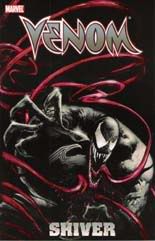 When a soldier posted in Northern Canada makes a routine trip to a nearby lab, finds most of the scientists slaughtered and shepherds the sole survivor back to her outpost, she unwittingly unleashes one of Marvel’s most psychotic and popular villains on her fellow soldiers. Shortly after violence erupts in the outpost, a mysterious man in black arrives who may be the soldiers’ only hope of salvation.
When a soldier posted in Northern Canada makes a routine trip to a nearby lab, finds most of the scientists slaughtered and shepherds the sole survivor back to her outpost, she unwittingly unleashes one of Marvel’s most psychotic and popular villains on her fellow soldiers. Shortly after violence erupts in the outpost, a mysterious man in black arrives who may be the soldiers’ only hope of salvation.
From start to finish, Shiver feels like Alien transplanted into the world of the Super. That said, the story isn’t half-bad. It isn’t particularly remarkable; but it’s suspenseful and scary, with a surprise ending that gets you curious about what’s to come.
Early on, it’s clear this is a series that suffered in the floppy format due in no small part to Way’s falling in line with Marvel’s Jemas-era philosophy that rarely featuring the main superguy helped build suspense. Venom doesn’t show up until the very end of the second chapter. It works in the trade, but it’s easy to imagine monthly readers getting frustrated.
Fans of Venom’s web-headed nemesis should know that Shiver seems to break from standard continuity, in that the symbiote attaches itself to hosts and uses them up in a matter of hours, whereas I’m pretty sure in his earlier appearances Venom stuck with just one guy for a prolonged period.
Neither the pacing nor any splits from previous Venom history weakens this trade as much as Herrera’s art. His exaggerated, droopy style is completely mismatched with the story’s tone. It seems clear Herrera’s renderings of Venom himself, which are admittedly very creepy and evoke the chaotic nature of the character, were the main factor in the decision to sign him on to the book.
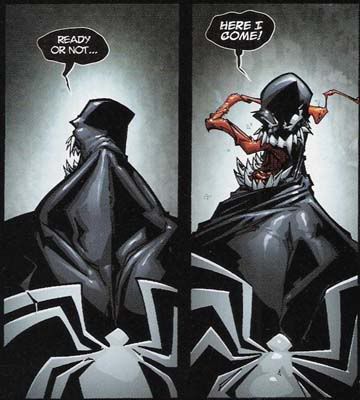
Unfortunately, as was already mentioned, Venom’s appearances overall are sparse and he’s by no means the protagonist in spite of the title of the comic. Most of the characters are perfectly human and Herrera’s treatment of anatomy is sometimes simply too cartoony for a horror story, and other times it’s just plain embarrassing.

If it weren’t for Herrera, I’d probably get myself a copy of the second trade. I bought this trade in part to get a sample from the writer who will be scripting an upcoming arc from my favorite green guy’s home title. While I read a lot of negative stuff about him (mostly on message boards where the biggest complaints revolved around his demeanor during interviews and his stated apathy towards continuity), I was happy with the story. It’s no Watchmen, but it’s a solid and compelling horror/sci-fi tale. With Herrera on the drawing duties, however, I won’t bother. I don’t necessarily think that’s indicative of Herrera’s talent, either. I just think he was the wrong guy for the project.
Venom Vs. Carnage
Script by Peter Milligan, Art by Clayton Craig
Published by Marvel; $9.99 US
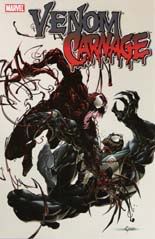 Initially at each other’s throats, symbiote villains Venom and Carnage form an uneasy alliance when they learn that Carnage’s offspring is more likely to walk the path of a hero.
Initially at each other’s throats, symbiote villains Venom and Carnage form an uneasy alliance when they learn that Carnage’s offspring is more likely to walk the path of a hero.
With yesterday’s review of Marvel Team-Up, and my review a few weeks ago of Essential Super-Villain Team-Up, I’ve learned not to judge a book by its title. Venom Vs. Carnage’s title is as misleading as the aforementioned examples. While the two villains do tussle a little bit, mostly in the first chapter of the trade, the story doesn’t center on their conflict but on the origin story of a new hero: Toxin.
NYPD officer Pat Mulligan is the host of Carnage’s offspring. His life is turned upside-down as he realizes he will soon have to join the desperate world his brief tutors - Black Cat and Spider-Man - inhabit day after day. His final decision at the end of the trade tugs at your heartstrings a bit, but for the most part there’s nothing particularly original or impressive about the story. Nice guy gets powers he doesn’t want. That sums it up.
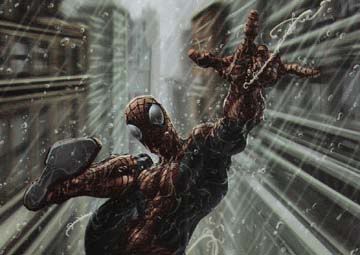
Clayton Craig’s art is either the story’s biggest weakness or greatest strength, depending on where your tastes lie. His art has a kind of bas relief feel to it, as if the lines and contours were rising off the page. His action scenes are spectacular, though in some cases the dark colors can confuse.
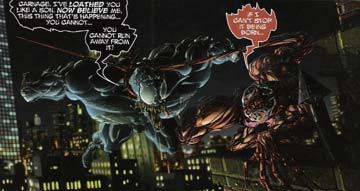
In spite of the gratuitous Black Cat T-and-A shots that promise to render hundreds of copies of Venom Vs. Carnage as sticky as Spider-Man’s webs, Craig’s drawings of the non-super could use some work. There’s a very strong generic and stiff quality to the faces of his subjects, something like what you’ll find in digitally-rendered TV cartoons.
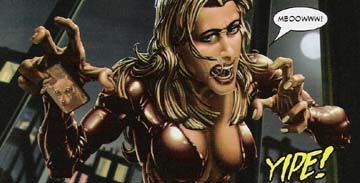
Despite some cool action sequences, Venom Vs. Carnage left me wanting, and it certainly didn’t convince me to check out the mini-series it acts as prequel to: Milligan and Darick Robertson’s Toxin.
Script by Daniel Way, Art by Francisco Herrera
Published by Marvel; $13.99 US
 When a soldier posted in Northern Canada makes a routine trip to a nearby lab, finds most of the scientists slaughtered and shepherds the sole survivor back to her outpost, she unwittingly unleashes one of Marvel’s most psychotic and popular villains on her fellow soldiers. Shortly after violence erupts in the outpost, a mysterious man in black arrives who may be the soldiers’ only hope of salvation.
When a soldier posted in Northern Canada makes a routine trip to a nearby lab, finds most of the scientists slaughtered and shepherds the sole survivor back to her outpost, she unwittingly unleashes one of Marvel’s most psychotic and popular villains on her fellow soldiers. Shortly after violence erupts in the outpost, a mysterious man in black arrives who may be the soldiers’ only hope of salvation. From start to finish, Shiver feels like Alien transplanted into the world of the Super. That said, the story isn’t half-bad. It isn’t particularly remarkable; but it’s suspenseful and scary, with a surprise ending that gets you curious about what’s to come.
Early on, it’s clear this is a series that suffered in the floppy format due in no small part to Way’s falling in line with Marvel’s Jemas-era philosophy that rarely featuring the main superguy helped build suspense. Venom doesn’t show up until the very end of the second chapter. It works in the trade, but it’s easy to imagine monthly readers getting frustrated.
Fans of Venom’s web-headed nemesis should know that Shiver seems to break from standard continuity, in that the symbiote attaches itself to hosts and uses them up in a matter of hours, whereas I’m pretty sure in his earlier appearances Venom stuck with just one guy for a prolonged period.
Neither the pacing nor any splits from previous Venom history weakens this trade as much as Herrera’s art. His exaggerated, droopy style is completely mismatched with the story’s tone. It seems clear Herrera’s renderings of Venom himself, which are admittedly very creepy and evoke the chaotic nature of the character, were the main factor in the decision to sign him on to the book.

Unfortunately, as was already mentioned, Venom’s appearances overall are sparse and he’s by no means the protagonist in spite of the title of the comic. Most of the characters are perfectly human and Herrera’s treatment of anatomy is sometimes simply too cartoony for a horror story, and other times it’s just plain embarrassing.

If it weren’t for Herrera, I’d probably get myself a copy of the second trade. I bought this trade in part to get a sample from the writer who will be scripting an upcoming arc from my favorite green guy’s home title. While I read a lot of negative stuff about him (mostly on message boards where the biggest complaints revolved around his demeanor during interviews and his stated apathy towards continuity), I was happy with the story. It’s no Watchmen, but it’s a solid and compelling horror/sci-fi tale. With Herrera on the drawing duties, however, I won’t bother. I don’t necessarily think that’s indicative of Herrera’s talent, either. I just think he was the wrong guy for the project.
Venom Vs. Carnage
Script by Peter Milligan, Art by Clayton Craig
Published by Marvel; $9.99 US
 Initially at each other’s throats, symbiote villains Venom and Carnage form an uneasy alliance when they learn that Carnage’s offspring is more likely to walk the path of a hero.
Initially at each other’s throats, symbiote villains Venom and Carnage form an uneasy alliance when they learn that Carnage’s offspring is more likely to walk the path of a hero.With yesterday’s review of Marvel Team-Up, and my review a few weeks ago of Essential Super-Villain Team-Up, I’ve learned not to judge a book by its title. Venom Vs. Carnage’s title is as misleading as the aforementioned examples. While the two villains do tussle a little bit, mostly in the first chapter of the trade, the story doesn’t center on their conflict but on the origin story of a new hero: Toxin.
NYPD officer Pat Mulligan is the host of Carnage’s offspring. His life is turned upside-down as he realizes he will soon have to join the desperate world his brief tutors - Black Cat and Spider-Man - inhabit day after day. His final decision at the end of the trade tugs at your heartstrings a bit, but for the most part there’s nothing particularly original or impressive about the story. Nice guy gets powers he doesn’t want. That sums it up.

Clayton Craig’s art is either the story’s biggest weakness or greatest strength, depending on where your tastes lie. His art has a kind of bas relief feel to it, as if the lines and contours were rising off the page. His action scenes are spectacular, though in some cases the dark colors can confuse.

In spite of the gratuitous Black Cat T-and-A shots that promise to render hundreds of copies of Venom Vs. Carnage as sticky as Spider-Man’s webs, Craig’s drawings of the non-super could use some work. There’s a very strong generic and stiff quality to the faces of his subjects, something like what you’ll find in digitally-rendered TV cartoons.

Despite some cool action sequences, Venom Vs. Carnage left me wanting, and it certainly didn’t convince me to check out the mini-series it acts as prequel to: Milligan and Darick Robertson’s Toxin.
Labels:
Graphic Novel/Comic Book Reviews
Monday, October 24, 2005
Marvel Team-Up, Vol. 1: The Golden Child
Script by Robert Kirkman, Art by Scott Kolins
Published by Marvel; $14.99 US
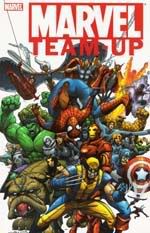 It’s with genuine surprise and a little embarrassment that I have to admit I enjoyed Marvel Team-Up, Vol. 1: The Golden Child.
It’s with genuine surprise and a little embarrassment that I have to admit I enjoyed Marvel Team-Up, Vol. 1: The Golden Child.
It begins with a discovery, by both Spider-Man and the X-men, of a teenage boy with dangerous powers. The conflict expands when an evil alternate reality Iron Man captures the boy in the hopes that he can use the teenager’s power to send him back to his own reality. In the meantime, a skrull villain named Titannus has something to do with the conflict, though it isn’t made clear exactly how. Unlike the original Marvel Team-Up, which usually featured one regular character (Spider-Man, 99% of the time) and one guest character, the cast of Kirkman’s MTU is always rotating (though Spider-Man still seems to find a way back every few issues), and the storyline remains constant throughout the line-up changes. Heroes appearing in the The Golden Child include the FF, Dr. Strange, the Hulk, Sunfire, and Captain America.
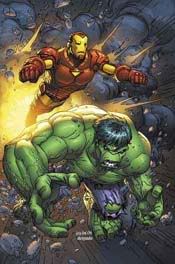 Kirkman’s scripting isn’t particularly impressive. The cute jokes characters like Spider-Man and Wolverine knock back and forth seem terribly forced (like the big revelation at the end of the trade that other heroes find Spider-Man annoying, about insightful as pointing out that other heroes find the Hulk to be green) and certain characters are tacked on for little or no reason (Black Widow and X-23 most notably). As was sometimes the case with the old series, you really can’t trust the cover. For example, the issue reprinted in the fourth chapter was originally advertised as a team-up between Iron Man and the Hulk. In fact, the Hulk only shows up for a few pages (both Doctor Strange and the FF are featured more prominently than the green golaith), he trades blows with Iron Man rather than “teaming up,” and the Iron Man appearing is not the one on the front cover, but the aforementioned alternate reality version.
Kirkman’s scripting isn’t particularly impressive. The cute jokes characters like Spider-Man and Wolverine knock back and forth seem terribly forced (like the big revelation at the end of the trade that other heroes find Spider-Man annoying, about insightful as pointing out that other heroes find the Hulk to be green) and certain characters are tacked on for little or no reason (Black Widow and X-23 most notably). As was sometimes the case with the old series, you really can’t trust the cover. For example, the issue reprinted in the fourth chapter was originally advertised as a team-up between Iron Man and the Hulk. In fact, the Hulk only shows up for a few pages (both Doctor Strange and the FF are featured more prominently than the green golaith), he trades blows with Iron Man rather than “teaming up,” and the Iron Man appearing is not the one on the front cover, but the aforementioned alternate reality version.
I can’t blame anyone for wanting to chain me to the back of a van and drive through a construction site after reading the following, but what I like about MTU is that, in different ways, it seems like Marvel’s (vastly inferior) answer to books like Seven Soldiers and even Astro City.
Like Astro City, MTU gives it readers a vibrant world thick with superheroes which, you know, is fitting since the Marvel Universe is a vibrant world thick with superheroes. Characters like Moon Knight appear briefly for one or two panels only to silently melt into the shadows. One chapter opens with a splash of Nova (the Larsen one, not the Herald) screeching over the streets and calling out his name, even though he has nothing to do with the rest of the story. The book’s appeal, I think, has more to do with post-Jemas fallout than anything else. After a few years of the various Marvel creative teams all but denying the fact that Daredevil, the Hulk, the Avengers, the X-men, etc. all existed in the same world, readers are understandably relieved to find a Marvel book that not only acknowledges the fact that - regardless of their different home titles - these heroes are essentially characters in the same story, but revels in it.
As far as how it’s like Seven Soldiers, well, the thing is that as much as I have almost nothing but bile to spew when it comes to conversations about crossover events like Infinite Crisis or House of M, the fact is that I dig the concept behind the company-wide event. At least, I dig the concept the companies use to sell the things, not the actual concept ($$$). The idea of an adventure that takes heroes usually confined to their home titles and brings them together for a larger story is cool. It’s epic. It’s ambitious. It has promise. The reason I refuse to buy the big, stupid things is that the promise is never kept. It can’t be kept precisely because of the confines of a cooperative universe. There’s too many chefs in the kitchen and as a result the overall feel of the story suffers, as does the narrative since in almost every case the different creative teams fail to get their stories straight. The hype that each event will "change everything!!!!!" is either absolutely wrong, or completely correct except the changes in question don’t save the overall craptaculation of the event.
When I first heard of it, I felt one of the ideas behind Seven Soldiers was to give readers the ideal crossover event. With only one writer at the helm, it’s less likely to suffer from "too many chefs," and since it never makes the promise of "changing everything!!!!!!!" you just get an epic adventure with multiple protagonists.
Kirkman’s Marvel Team-Up seems to be more of the same, though it’s doubtful that its quality matches Morrison’s (I honestly don’t know, still waiting for the trade, but it’s Morrison). In this sense, The Golden Child shows promise, and I’ll freely admit I’m as much of a victim of the post-Jemas fall-out as the aforementioned Marvel readers. My enjoyment of it has nothing to do with appreciating it as high art. This is pure nostalgia for the cooperative universe I fell in love with as a child.
Scott Kolins’s art doesn’t hurt either. It’s the most impressive element of the comic, and it’s likely if/when he leaves the title, I’ll stop buying the trades.
Published by Marvel; $14.99 US
 It’s with genuine surprise and a little embarrassment that I have to admit I enjoyed Marvel Team-Up, Vol. 1: The Golden Child.
It’s with genuine surprise and a little embarrassment that I have to admit I enjoyed Marvel Team-Up, Vol. 1: The Golden Child.It begins with a discovery, by both Spider-Man and the X-men, of a teenage boy with dangerous powers. The conflict expands when an evil alternate reality Iron Man captures the boy in the hopes that he can use the teenager’s power to send him back to his own reality. In the meantime, a skrull villain named Titannus has something to do with the conflict, though it isn’t made clear exactly how. Unlike the original Marvel Team-Up, which usually featured one regular character (Spider-Man, 99% of the time) and one guest character, the cast of Kirkman’s MTU is always rotating (though Spider-Man still seems to find a way back every few issues), and the storyline remains constant throughout the line-up changes. Heroes appearing in the The Golden Child include the FF, Dr. Strange, the Hulk, Sunfire, and Captain America.
 Kirkman’s scripting isn’t particularly impressive. The cute jokes characters like Spider-Man and Wolverine knock back and forth seem terribly forced (like the big revelation at the end of the trade that other heroes find Spider-Man annoying, about insightful as pointing out that other heroes find the Hulk to be green) and certain characters are tacked on for little or no reason (Black Widow and X-23 most notably). As was sometimes the case with the old series, you really can’t trust the cover. For example, the issue reprinted in the fourth chapter was originally advertised as a team-up between Iron Man and the Hulk. In fact, the Hulk only shows up for a few pages (both Doctor Strange and the FF are featured more prominently than the green golaith), he trades blows with Iron Man rather than “teaming up,” and the Iron Man appearing is not the one on the front cover, but the aforementioned alternate reality version.
Kirkman’s scripting isn’t particularly impressive. The cute jokes characters like Spider-Man and Wolverine knock back and forth seem terribly forced (like the big revelation at the end of the trade that other heroes find Spider-Man annoying, about insightful as pointing out that other heroes find the Hulk to be green) and certain characters are tacked on for little or no reason (Black Widow and X-23 most notably). As was sometimes the case with the old series, you really can’t trust the cover. For example, the issue reprinted in the fourth chapter was originally advertised as a team-up between Iron Man and the Hulk. In fact, the Hulk only shows up for a few pages (both Doctor Strange and the FF are featured more prominently than the green golaith), he trades blows with Iron Man rather than “teaming up,” and the Iron Man appearing is not the one on the front cover, but the aforementioned alternate reality version.I can’t blame anyone for wanting to chain me to the back of a van and drive through a construction site after reading the following, but what I like about MTU is that, in different ways, it seems like Marvel’s (vastly inferior) answer to books like Seven Soldiers and even Astro City.
Like Astro City, MTU gives it readers a vibrant world thick with superheroes which, you know, is fitting since the Marvel Universe is a vibrant world thick with superheroes. Characters like Moon Knight appear briefly for one or two panels only to silently melt into the shadows. One chapter opens with a splash of Nova (the Larsen one, not the Herald) screeching over the streets and calling out his name, even though he has nothing to do with the rest of the story. The book’s appeal, I think, has more to do with post-Jemas fallout than anything else. After a few years of the various Marvel creative teams all but denying the fact that Daredevil, the Hulk, the Avengers, the X-men, etc. all existed in the same world, readers are understandably relieved to find a Marvel book that not only acknowledges the fact that - regardless of their different home titles - these heroes are essentially characters in the same story, but revels in it.
As far as how it’s like Seven Soldiers, well, the thing is that as much as I have almost nothing but bile to spew when it comes to conversations about crossover events like Infinite Crisis or House of M, the fact is that I dig the concept behind the company-wide event. At least, I dig the concept the companies use to sell the things, not the actual concept ($$$). The idea of an adventure that takes heroes usually confined to their home titles and brings them together for a larger story is cool. It’s epic. It’s ambitious. It has promise. The reason I refuse to buy the big, stupid things is that the promise is never kept. It can’t be kept precisely because of the confines of a cooperative universe. There’s too many chefs in the kitchen and as a result the overall feel of the story suffers, as does the narrative since in almost every case the different creative teams fail to get their stories straight. The hype that each event will "change everything!!!!!" is either absolutely wrong, or completely correct except the changes in question don’t save the overall craptaculation of the event.
When I first heard of it, I felt one of the ideas behind Seven Soldiers was to give readers the ideal crossover event. With only one writer at the helm, it’s less likely to suffer from "too many chefs," and since it never makes the promise of "changing everything!!!!!!!" you just get an epic adventure with multiple protagonists.
Kirkman’s Marvel Team-Up seems to be more of the same, though it’s doubtful that its quality matches Morrison’s (I honestly don’t know, still waiting for the trade, but it’s Morrison). In this sense, The Golden Child shows promise, and I’ll freely admit I’m as much of a victim of the post-Jemas fall-out as the aforementioned Marvel readers. My enjoyment of it has nothing to do with appreciating it as high art. This is pure nostalgia for the cooperative universe I fell in love with as a child.
Scott Kolins’s art doesn’t hurt either. It’s the most impressive element of the comic, and it’s likely if/when he leaves the title, I’ll stop buying the trades.
Labels:
Graphic Novel/Comic Book Reviews
Friday, October 21, 2005
Mick's Top Ten Best of Buffy, Part Four
This is it! Mick reveals his choice for the top spot in his Top Ten Best of Buffy. First, a brief recap of the other spots on the list.
TEN: "SUPERSTAR"
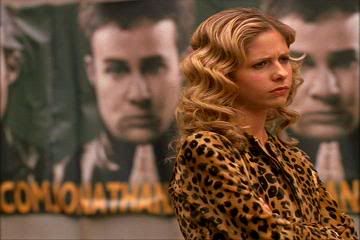
NINE: "HUSH"
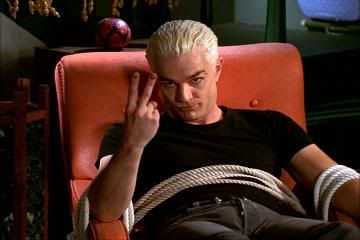
EIGHT: "RESTLESS"
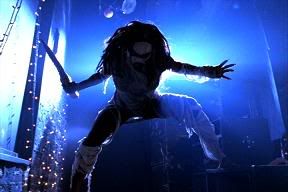
SEVEN: "GRADUATION DAY" part 1 & 2
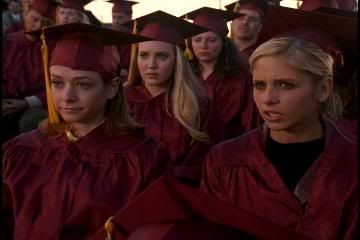
SIX: "BECOMING" part 1 & 2
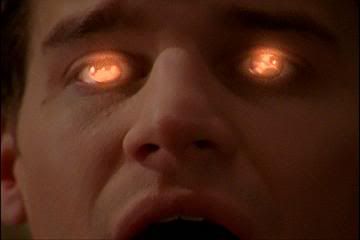
FIVE: "THE GIFT"
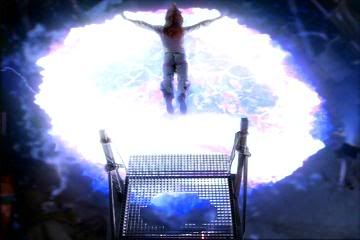
FOUR: "ONCE MORE, WITH FEELING"
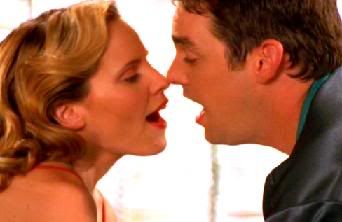
THREE: "FOOL FOR LOVE"
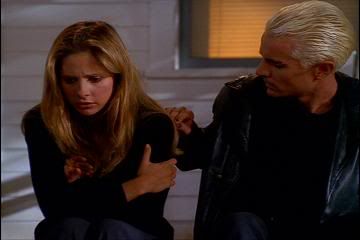
TWO: "PASSION"
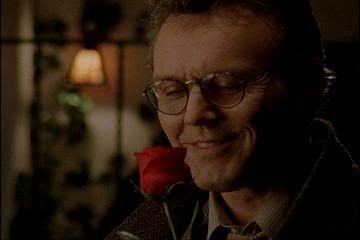
For writing and directing credits, episode and season numbers, air dates, and reviews of each: Part One, Part Two, and Part Three.
Also, before revealing the winner of the number one spot, a few links. I want to thank the folks at Buffy Guide and Buffy World, whose comprehensive episode guides helped me out a lot. Also, inspired by my obsessive ranting, my girlfriend posted her own Bottom Ten of Buffy.
And now, the moment you’ve all been waiting for.
Mick’s choice for the best episode of Buffy the Vampire Slayer is...
ONE: "THE PROM"
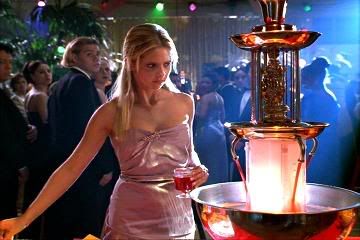
Season 3, Episode 20, Air Date: 5/18/99
Written by Marti Noxon, Directed by David Solomon
"The Prom" aired right before the two-part conclusion to the third season, "Graduation Day". Haunted by dark dreams as well as Joyce’s hard words, Angel is finally convinced that Buffy’s attachment to him will destroy her in the end, and breaks up with her. As she’s still dealing with the break-up, the Scoobies discover a Sunnydale High misfit plans on unleashing a pack of Hellhounds on the senior class during the prom. Determined to prevent the attack before so much as one demon can make its way to the school, Buffy orders the rest of the gang to the prom so they can enjoy what she suspects might be one of their final nights on Earth (by this point, the Scoobies are well aware of the Mayor’s apocalyptic plans and aren’t convinced they can stop them).
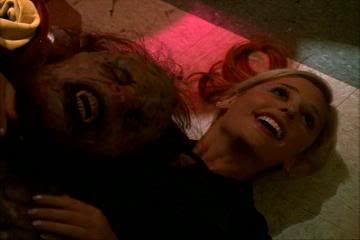
Buffy succeeds in stopping the hounds - killing the last one even as he tears at the gymnasium door - and eventually makes her way to the prom. Shortly afterwards, some of the most heartbreaking, tear-jerking, and bittersweet scenes ever aired on television unfold. If this show doesn’t make you cry, your heart’s more stonier than Ben Grimm.
As time goes by after your first viewing, the episode just becomes more powerful. For a regular viewer of the show it’s near impossible to watch the final slow dance of the episode without thinking about your own torrential teenage days, particularly when you consider how the assembled heroes would eventually scatter; either through death, transfer to another show, or, er, cheating-by-werewolf.
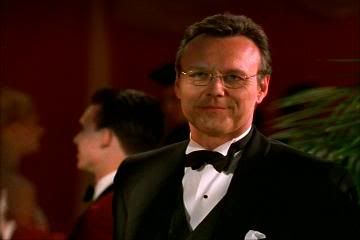
It’s also an example of how Whedon & Co. mastered the art of suspense. It's difficult for me to read or view any kind of action-oriented story and really doubt that the heroes will prevail. Whedon’s always kept me on my toes. Even more recently, with Serenity, I was all but convinced that he planned on killing the entire cast before the credits rolled. Usually, he keeps his viewers doubts alive with his unswerving willingness to mercilessly slaughter favorite characters, and usually in ways that are not nearly as dignified and heroic as Spike’s (temporary) death in the series finale. While part of me still protests the brutal end Anya met in the same episode, I have to admit that it succeeded in convincing me that the bad guys actually had a chance of winning.
With "The Prom" however, the creative team not only didn’t kill anyone, they gave viewers such a picturesque conclusion that you couldn’t help but think that things were two seconds away from going to complete Hell. It just felt too happy to not be followed up with a slaughterhouse.
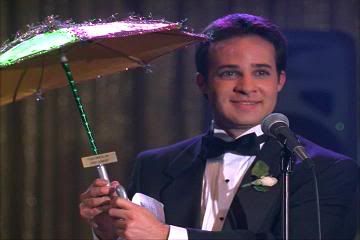
The first stop at cheesiness is Buffy’s receipt of the Class Protector Award from the Prom Committee. The creative team, as usual, diffuses the cheesiness with well-placed humor, and after three years of Buffy’s selfless heroics for the sake of a seemingly ungrateful student body, she finally gets the recognition she’s deserved. Like the earlier episode "Gingerbread," it touches upon what might be considered a glaring discrepancy in the series: the sheer number of battles between the heroes and clearly supernatural beasts vs. the town’s apparent ignorance of anything strange going on. You can’t help but wonder, with three years of Sunnydale High superheroism under her belt, why the sheer numbers of students Buffy had saved hadn’t helped her get a notch or two up the social ladder. With the restraints of cliques and high school social status about to dissipate, the students finally show their true colors. It’s not only a surprisingly affecting scene, but absolutely necessary. Without it, the Scoobies’ recruitment and organization of the senior class at the end of "Graduation Day" would never have made sense.
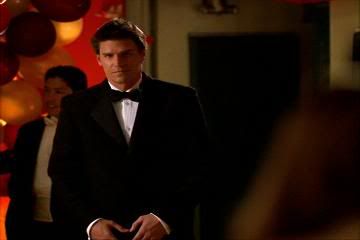
Angel’s appearance in the last few minutes shouldn’t affect you, but it does. You can’t help it. You’re softened a little by Xander’s final peacemaking with Cordelia, reduced to the durability of Nerf by the award ceremony, and when Angel shows up - even though you knew as soon as he broke up with her that he’d show up at the prom anyway - you’re done. It’s over. You’re a weep-monster.
"The Prom" was an example of how Whedon not only wonderfully mixed elements of drama, horror, and humor, but also how he turned the horror genre on its head. Just as Buffy was the young, attractive teenage girl who was predator instead of prey to the monsters and villains of horror and slasher flicks, "The Prom" was both a parody of, and a victorious middle finger to, films like Prom Night and Carrie that made high school proms one of the favorite homes of fictional bloodbaths. It was the perfect embodiment of the conceptual genius behind the series, which is why, in my humble opinion, it deserves the title of Best Buffy ever.
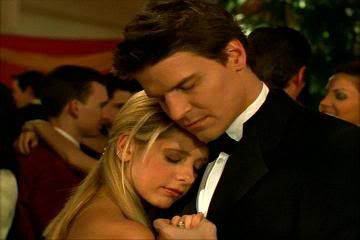
Well, that’s it. I doubt any Buffy fans would ever completely agree with what I didn't include, what I did include, or how I included it. I have no doubt, however, that most fans would agree that all ten episodes are prime examples of why Buffy the Vampire Slayer was one of the best television series of recent memory. Any comments? Feel free to e-mail me or comment here at the blog, and look for a somewhat expanded piece on Buffy over at Comic Book Galaxy sometime in the near future.
Thanks for visiting the Burn during Buffy week!
(fuck, now I need a new banner)
TEN: "SUPERSTAR"

NINE: "HUSH"

EIGHT: "RESTLESS"

SEVEN: "GRADUATION DAY" part 1 & 2

SIX: "BECOMING" part 1 & 2

FIVE: "THE GIFT"

FOUR: "ONCE MORE, WITH FEELING"

THREE: "FOOL FOR LOVE"

TWO: "PASSION"

For writing and directing credits, episode and season numbers, air dates, and reviews of each: Part One, Part Two, and Part Three.
Also, before revealing the winner of the number one spot, a few links. I want to thank the folks at Buffy Guide and Buffy World, whose comprehensive episode guides helped me out a lot. Also, inspired by my obsessive ranting, my girlfriend posted her own Bottom Ten of Buffy.
And now, the moment you’ve all been waiting for.
Mick’s choice for the best episode of Buffy the Vampire Slayer is...
ONE: "THE PROM"

Season 3, Episode 20, Air Date: 5/18/99
Written by Marti Noxon, Directed by David Solomon
"The Prom" aired right before the two-part conclusion to the third season, "Graduation Day". Haunted by dark dreams as well as Joyce’s hard words, Angel is finally convinced that Buffy’s attachment to him will destroy her in the end, and breaks up with her. As she’s still dealing with the break-up, the Scoobies discover a Sunnydale High misfit plans on unleashing a pack of Hellhounds on the senior class during the prom. Determined to prevent the attack before so much as one demon can make its way to the school, Buffy orders the rest of the gang to the prom so they can enjoy what she suspects might be one of their final nights on Earth (by this point, the Scoobies are well aware of the Mayor’s apocalyptic plans and aren’t convinced they can stop them).

Buffy succeeds in stopping the hounds - killing the last one even as he tears at the gymnasium door - and eventually makes her way to the prom. Shortly afterwards, some of the most heartbreaking, tear-jerking, and bittersweet scenes ever aired on television unfold. If this show doesn’t make you cry, your heart’s more stonier than Ben Grimm.
As time goes by after your first viewing, the episode just becomes more powerful. For a regular viewer of the show it’s near impossible to watch the final slow dance of the episode without thinking about your own torrential teenage days, particularly when you consider how the assembled heroes would eventually scatter; either through death, transfer to another show, or, er, cheating-by-werewolf.

It’s also an example of how Whedon & Co. mastered the art of suspense. It's difficult for me to read or view any kind of action-oriented story and really doubt that the heroes will prevail. Whedon’s always kept me on my toes. Even more recently, with Serenity, I was all but convinced that he planned on killing the entire cast before the credits rolled. Usually, he keeps his viewers doubts alive with his unswerving willingness to mercilessly slaughter favorite characters, and usually in ways that are not nearly as dignified and heroic as Spike’s (temporary) death in the series finale. While part of me still protests the brutal end Anya met in the same episode, I have to admit that it succeeded in convincing me that the bad guys actually had a chance of winning.
With "The Prom" however, the creative team not only didn’t kill anyone, they gave viewers such a picturesque conclusion that you couldn’t help but think that things were two seconds away from going to complete Hell. It just felt too happy to not be followed up with a slaughterhouse.

The first stop at cheesiness is Buffy’s receipt of the Class Protector Award from the Prom Committee. The creative team, as usual, diffuses the cheesiness with well-placed humor, and after three years of Buffy’s selfless heroics for the sake of a seemingly ungrateful student body, she finally gets the recognition she’s deserved. Like the earlier episode "Gingerbread," it touches upon what might be considered a glaring discrepancy in the series: the sheer number of battles between the heroes and clearly supernatural beasts vs. the town’s apparent ignorance of anything strange going on. You can’t help but wonder, with three years of Sunnydale High superheroism under her belt, why the sheer numbers of students Buffy had saved hadn’t helped her get a notch or two up the social ladder. With the restraints of cliques and high school social status about to dissipate, the students finally show their true colors. It’s not only a surprisingly affecting scene, but absolutely necessary. Without it, the Scoobies’ recruitment and organization of the senior class at the end of "Graduation Day" would never have made sense.

Angel’s appearance in the last few minutes shouldn’t affect you, but it does. You can’t help it. You’re softened a little by Xander’s final peacemaking with Cordelia, reduced to the durability of Nerf by the award ceremony, and when Angel shows up - even though you knew as soon as he broke up with her that he’d show up at the prom anyway - you’re done. It’s over. You’re a weep-monster.
"The Prom" was an example of how Whedon not only wonderfully mixed elements of drama, horror, and humor, but also how he turned the horror genre on its head. Just as Buffy was the young, attractive teenage girl who was predator instead of prey to the monsters and villains of horror and slasher flicks, "The Prom" was both a parody of, and a victorious middle finger to, films like Prom Night and Carrie that made high school proms one of the favorite homes of fictional bloodbaths. It was the perfect embodiment of the conceptual genius behind the series, which is why, in my humble opinion, it deserves the title of Best Buffy ever.

Well, that’s it. I doubt any Buffy fans would ever completely agree with what I didn't include, what I did include, or how I included it. I have no doubt, however, that most fans would agree that all ten episodes are prime examples of why Buffy the Vampire Slayer was one of the best television series of recent memory. Any comments? Feel free to e-mail me or comment here at the blog, and look for a somewhat expanded piece on Buffy over at Comic Book Galaxy sometime in the near future.
Thanks for visiting the Burn during Buffy week!
(fuck, now I need a new banner)
Labels:
Buffy the Vampire Slayer,
Television
Thursday, October 20, 2005
Mick's Top Ten Best of Buffy, Part Three
We’re over halfway to the top spot in Mick’s Top Ten Best of Buffy. For spots Ten through Five, click here and here.
And now - with the usual reminder that you will find evil SPOILERS in the Top Ten - let’s continue with the countdown!
FOUR: "ONCE MORE, WITH FEELING"
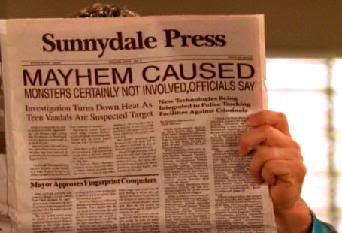
Season 6, Episode 7, Air Date: 11/6/01
Written and Directed by Joss Whedon
I hate musicals.
I worked for a local non-profit musical theater organization as a carpenter/stagehand for four summers. Before the end of the first summer, I was drawing pictures of men wearing Miss Saigon t-shirts hanging from nooses in letters to friends. And no, I don’t fucking think it’s so fucking nice to have fucking Dolly right fucking back where she fucking belongs. Fuck Dolly and everyone who looks like Dolly.
So I was not happy about the prospect of having to watch a musical episode of Buffy, but I was pleasantly surprised. "Once More, With Feeling" is now one of the most repeatedly played episode on my DVD player.
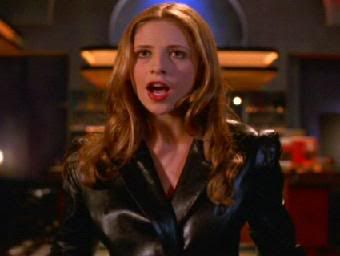
One of the things I hate most about musicals is the one-dimensional characterization. Everything, after all, is secondary to the silly singing and dancing. In the case of "Once More, With Feeling", I already knew the characters in question, and so there was never any threat that they would seem shallow or ill-conceived. Also, the sheer absurdity of the idea lent itself so well to the show.
As anyone who’s ever heard the opening theme from Firefly (which Whedon wrote) will attest, Joss Whedon has a rare gift of making his songs completely applicable to a very specific situation, while at the same time rendering them universal. Most of the episode's songs could be completely relevant outside Buffy. For example a line like "Nothing seems to penetrate my heart" from "Going Through The Motions" could easily be injected into songs having nothing to do with vampires or legendary woman warriors, but it makes the line that much better when Buffy sings it as she slams a stake into a vampire’s chest.
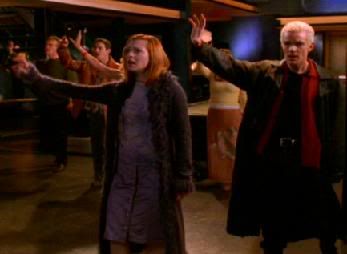
The episode also holds a special place for this humble viewer, in that - while the series finale was a year and a half way - it represents something of an emotional climax to the series. It was one of the last episodes with a unified group of Scoobies. Shortly afterwards Giles left for England, Xander and Anya split, Willow turned to the dark side, and Spike tried to rape Buffy. With the Summers home filled with Slayer-wanna-be’s in Season 7, the group of heroes would never really be the same. While I’m sure some may disagree, I feel it was also the series finale as far as quality was concerned. In fact my girlfriend (whose opinions have done quite a bit to influence my choices for the Top Ten) feels the rest of Season 6 may have suffered from the amount of time and energy put into the musical episode.
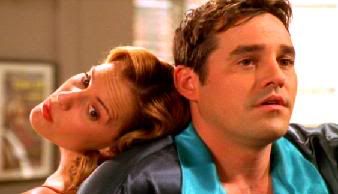
THREE: "FOOL FOR LOVE"
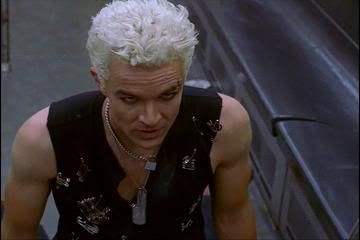
Season 5, Episode 7, Air Date: 11/14/00
Written by Douglas Petrie, Directed by Nick Marck
It isn't unreasonable to think that "Fool for Love" is on the list just because Spike is one of my favorite recurring characters on the show.
Still, I think its spot on the list is well-deserved. Despite the fact that one could argue its mixing of flashback scenes of Spike’s early history with the present storyline makes it little more than a clone of "Becoming", there’s a lot about "Fool for Love" that distinguishes it from the earlier two-parter and even improves upon it.
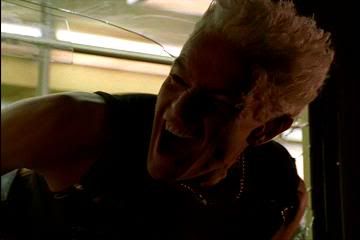
Unlike Angel or Drusilla, Spike is neither a psychotic nor a brooding guilt-machine. The element that makes him so fun to watch, an element that was never better illustrated than in "Fool for Love", is that he’s all about viciously reveling in what he is. When the 70's slayer smashes his head through the window of a subway train and he screams, the scream isn’t one of pain but of absolute joy. The joy of someone who's exactly where he wants to be.
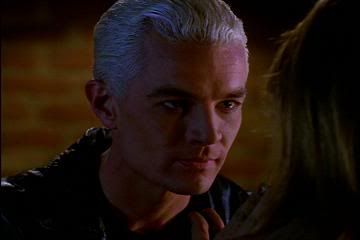
Also, while the flashbacks of "Becoming" served mainly as build-up to Angel’s fall, "Fool for love" both expanded on Spike’s character and acted as a parallel to Buffy’s inner conflict. When - in past and present - Spike brings his hands together inches from Buffy’s nose, it’s one of the most powerful moments ever between the two characters.
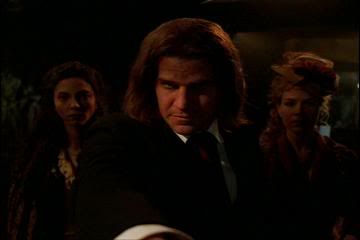
Another thing I love about the flashbacks - something I actually considered a downside until I was thinking about it in preparation for this review - is that, unlike "Becoming", Spike’s origin story is told directly from Spike’s lips and so the picture we get is tainted. Continuity hounds will remember, for example, that Angel was Spike’s sire (i.e., Angel turned Spike into a vampire). However, in "Fool for Love", it’s implied that Drusilla was his sire instead. Considering the sexuality inherent in Buffy vampirism, Spike might not like the idea of telling Buffy that it was a man who turned him, much less Angel. Likewise, Spike depicts Angel as a relatively tight-assed vampire who slaps Spike down every time he goes wild and takes risks. Of course, when Angel went to the dark side in Season 2 and allied himself with Spike and Drusilla, it was Spike who got nervous every time Angel got a little too eccentric.
TWO: "PASSION"
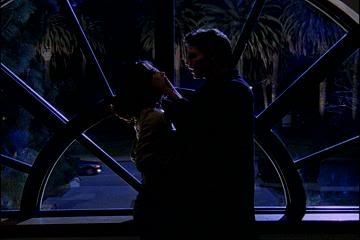
Season 5, Episode 17, Air Date: 2/24/98
Written by Ty King, Directed by Michael E. Gershman
In concept, direction, and acting talent "Passion" is uncontested in the entire Buffy collection. It’s as if Whedon injected super-soldier serum into the veins of everyone involved and said, "Oh, I forgot to tell you, this is the episode where you’re all fucking perfect."
There are a lot of things to love about "Passion". With the first death of a recurring good guy - Jenny Calendar - it’s one of the darkest episodes of the series. The funny’s still there (particularly with Cordelia’s attempts to de-invite Angel from her car), but it takes a backseat. Instead of the usual straightman/funnyman chemistry between Giles and Xander, the two nearly come to blows. Joyce’s conscious ignorance of her daughter’s weird night life begins to chip away when she finds out Buffy lost her virginity to Angel. Giles’s emotional walls come tumbling down when Jenny’s death sends him on a collision course with Angel (with a scene that makes you jump in your chair and cheer the first time you see it).
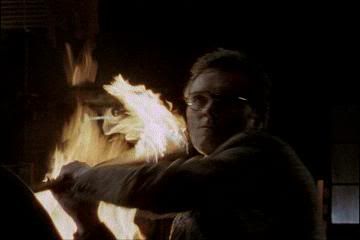
I’ve always felt Boreanaz was better as a villain than a hero and "Passion" saw his greatest portrayal of the soulless Angel. More than anything else, "Passion" conveys the sense that when it comes to Angel’s love for Buffy, nothing has changed. He still loves her, it’s just that love from a psychotic vampire (particularly one that’s been locked up for over a century) is not a good thing. Or, as Willow aptly puts it to Buffy, "You’re still all he thinks about." It's a feeling that was lost towards the end of the season, but that doesn't take away any of this episode's awesome power.
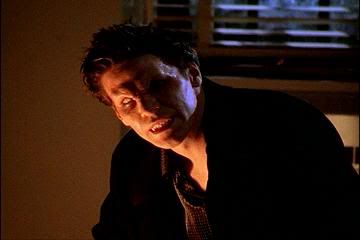
Wow! Mick mentioned super-soldier serum in that review! How could anything be better than that? What could number one in Mick’s Top Ten Best of Buffy possibly be?!?!?!
Find out tomorrow!
And now - with the usual reminder that you will find evil SPOILERS in the Top Ten - let’s continue with the countdown!
FOUR: "ONCE MORE, WITH FEELING"

Season 6, Episode 7, Air Date: 11/6/01
Written and Directed by Joss Whedon
I hate musicals.
I worked for a local non-profit musical theater organization as a carpenter/stagehand for four summers. Before the end of the first summer, I was drawing pictures of men wearing Miss Saigon t-shirts hanging from nooses in letters to friends. And no, I don’t fucking think it’s so fucking nice to have fucking Dolly right fucking back where she fucking belongs. Fuck Dolly and everyone who looks like Dolly.
So I was not happy about the prospect of having to watch a musical episode of Buffy, but I was pleasantly surprised. "Once More, With Feeling" is now one of the most repeatedly played episode on my DVD player.

One of the things I hate most about musicals is the one-dimensional characterization. Everything, after all, is secondary to the silly singing and dancing. In the case of "Once More, With Feeling", I already knew the characters in question, and so there was never any threat that they would seem shallow or ill-conceived. Also, the sheer absurdity of the idea lent itself so well to the show.
As anyone who’s ever heard the opening theme from Firefly (which Whedon wrote) will attest, Joss Whedon has a rare gift of making his songs completely applicable to a very specific situation, while at the same time rendering them universal. Most of the episode's songs could be completely relevant outside Buffy. For example a line like "Nothing seems to penetrate my heart" from "Going Through The Motions" could easily be injected into songs having nothing to do with vampires or legendary woman warriors, but it makes the line that much better when Buffy sings it as she slams a stake into a vampire’s chest.

The episode also holds a special place for this humble viewer, in that - while the series finale was a year and a half way - it represents something of an emotional climax to the series. It was one of the last episodes with a unified group of Scoobies. Shortly afterwards Giles left for England, Xander and Anya split, Willow turned to the dark side, and Spike tried to rape Buffy. With the Summers home filled with Slayer-wanna-be’s in Season 7, the group of heroes would never really be the same. While I’m sure some may disagree, I feel it was also the series finale as far as quality was concerned. In fact my girlfriend (whose opinions have done quite a bit to influence my choices for the Top Ten) feels the rest of Season 6 may have suffered from the amount of time and energy put into the musical episode.

THREE: "FOOL FOR LOVE"

Season 5, Episode 7, Air Date: 11/14/00
Written by Douglas Petrie, Directed by Nick Marck
It isn't unreasonable to think that "Fool for Love" is on the list just because Spike is one of my favorite recurring characters on the show.
Still, I think its spot on the list is well-deserved. Despite the fact that one could argue its mixing of flashback scenes of Spike’s early history with the present storyline makes it little more than a clone of "Becoming", there’s a lot about "Fool for Love" that distinguishes it from the earlier two-parter and even improves upon it.

Unlike Angel or Drusilla, Spike is neither a psychotic nor a brooding guilt-machine. The element that makes him so fun to watch, an element that was never better illustrated than in "Fool for Love", is that he’s all about viciously reveling in what he is. When the 70's slayer smashes his head through the window of a subway train and he screams, the scream isn’t one of pain but of absolute joy. The joy of someone who's exactly where he wants to be.

Also, while the flashbacks of "Becoming" served mainly as build-up to Angel’s fall, "Fool for love" both expanded on Spike’s character and acted as a parallel to Buffy’s inner conflict. When - in past and present - Spike brings his hands together inches from Buffy’s nose, it’s one of the most powerful moments ever between the two characters.

Another thing I love about the flashbacks - something I actually considered a downside until I was thinking about it in preparation for this review - is that, unlike "Becoming", Spike’s origin story is told directly from Spike’s lips and so the picture we get is tainted. Continuity hounds will remember, for example, that Angel was Spike’s sire (i.e., Angel turned Spike into a vampire). However, in "Fool for Love", it’s implied that Drusilla was his sire instead. Considering the sexuality inherent in Buffy vampirism, Spike might not like the idea of telling Buffy that it was a man who turned him, much less Angel. Likewise, Spike depicts Angel as a relatively tight-assed vampire who slaps Spike down every time he goes wild and takes risks. Of course, when Angel went to the dark side in Season 2 and allied himself with Spike and Drusilla, it was Spike who got nervous every time Angel got a little too eccentric.
TWO: "PASSION"

Season 5, Episode 17, Air Date: 2/24/98
Written by Ty King, Directed by Michael E. Gershman
In concept, direction, and acting talent "Passion" is uncontested in the entire Buffy collection. It’s as if Whedon injected super-soldier serum into the veins of everyone involved and said, "Oh, I forgot to tell you, this is the episode where you’re all fucking perfect."
There are a lot of things to love about "Passion". With the first death of a recurring good guy - Jenny Calendar - it’s one of the darkest episodes of the series. The funny’s still there (particularly with Cordelia’s attempts to de-invite Angel from her car), but it takes a backseat. Instead of the usual straightman/funnyman chemistry between Giles and Xander, the two nearly come to blows. Joyce’s conscious ignorance of her daughter’s weird night life begins to chip away when she finds out Buffy lost her virginity to Angel. Giles’s emotional walls come tumbling down when Jenny’s death sends him on a collision course with Angel (with a scene that makes you jump in your chair and cheer the first time you see it).

I’ve always felt Boreanaz was better as a villain than a hero and "Passion" saw his greatest portrayal of the soulless Angel. More than anything else, "Passion" conveys the sense that when it comes to Angel’s love for Buffy, nothing has changed. He still loves her, it’s just that love from a psychotic vampire (particularly one that’s been locked up for over a century) is not a good thing. Or, as Willow aptly puts it to Buffy, "You’re still all he thinks about." It's a feeling that was lost towards the end of the season, but that doesn't take away any of this episode's awesome power.

Wow! Mick mentioned super-soldier serum in that review! How could anything be better than that? What could number one in Mick’s Top Ten Best of Buffy possibly be?!?!?!
Find out tomorrow!
Labels:
Buffy the Vampire Slayer,
Television
Wednesday, October 19, 2005
Mick's Top Ten Best of Buffy, Part Two
Welcome to the second installment of Mick’s Top Ten Best of Buffy. Part one - featuring spots ten, nine, and eight - can be read here.
With a quick reminder that SPOILERS can be found below, let’s jump right into spots seven, six, and five.
SEVEN: “GRADUATION DAY part 1 & 2"
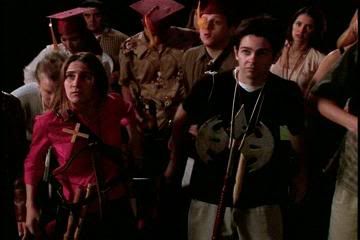
Season 3, Episodes 21 & 22, Air Dates: 5/18/99 & 7/13/99
Written and Directed by Joss Whedon
Along with offering a thundering climax to Buffy’s third season and helping to set up the first season of Angel, “Graduation Day” marked the end of an era. It would be a mistake to claim that the finale marked a “jump the shark” point, but the feel of the show was never the same once its heroes graduated. There was a particular chemistry between the characters in Sunnydale High that would never be repeated (which, you know, was kind of the point).
“Graduation Day” wasn’t particularly unique among Buffy season finales, other than the number of new developments. The episode gave viewers a surprising alliance between the students of Sunnydale High, the school’s destruction, the death of Principal Snyder as well as some of the more peripheral characters, Buffy severing ties with the Watcher’s Council, a final break-up between Buffy and Angel as well as a bloody pseudo-sex scene between the two, and an equally bloody climax to the conflict between Buffy and Faith the rogue slayer.
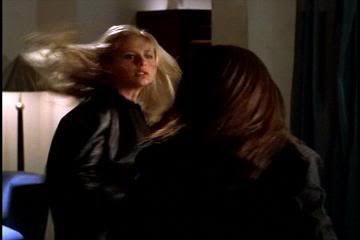
When choosing my Top Ten, I was usually careful not to choose something simply because it featured a so-called milestone event (e.g., episodes featuring the first appearances of characters who would later be key figures in the series, episodes featuring the deaths of regular characters, etc.), but “Graduation Day” is chock full of them. The episode is all about change, after all, and the new developments were necessary to get that across.
And you can’t go wrong with two of the series’ most engaging villains: Mayor Wilkins and his protege Faith. As much as I always felt Eliza Dushku was one of the least impressive actors on the series, the conflict between Faith and Buffy was riveting regardless. Harry Groener is equally fatherly, genial, and absolutely vicious as Mayor Wilkins. He remains one of the most genuinely intimidating and enjoyable Buffy bad guys. Both characters serve as examples of how the antagonists of Buffy could engage the audience better when they were more human than demon. Few of the “Big Bads” after Wilkins/Faith succeeded as well.
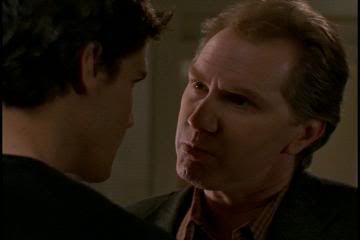
SIX: “BECOMING part 1 & 2"
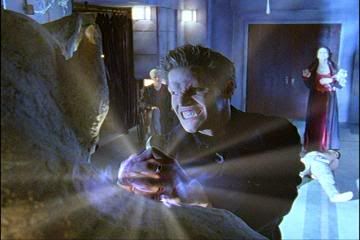
Season 2, Episodes 21 & 22, Air Dates: 5/12/98 & 5/19/98
Written and Directed by Joss Whedon
“Becoming” would, um, become a model for future episodes highlighting the early days of recurring vampire characters. Mixing the present story with scenes from Angel’s devilish past and the beginnings of his attempts to reconcile that past, “Becoming” gave its audience a prologue that rendered Buffy’s sacrifice of Angel that much more powerful.
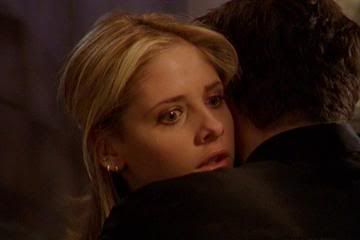
The sacrifice of Angel showed how Buffy had evolved into a woman who was willing to do the unthinkable for the sake of the world and simultaneously how she could never fit into the narrow role her heroic lineage dictated, served as a metaphor for the difficulty of letting go of destructive lovers, and gave Buffy viewers one of the most heartbreaking conclusions in the series (if not in the history of television).
On a side note, “Becoming” also rid the series of Kendra the slayer. Not only did this make way for Faith, but also did away with criminally fake accents until they reared their ugly heads again in Season 7.
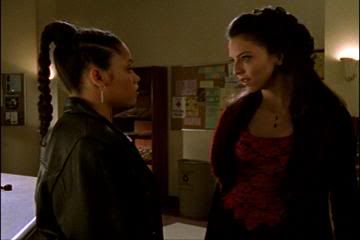
FIVE: “THE GIFT”
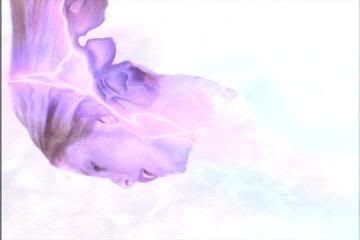
Season 5, Episode 22, Air Date: 5/22/01
Written and Directed by Joss Whedon
Never has a better episode of a TV series been made whose centerpiece was a fierce battle for the life of a character as annoying as Dawn Summers.
More than anything else, “The Gift” is a perfect example of how Whedon & co. manage to take a bunch of ridiculous elements that by all rights should never appear as anything but ridiculous and make them work. The combatants of the battle include a lovesick vampire, a Buffy decoy robot originally designed as a sex toy, and a vampire slayer battling a demon goddess with martial arts and a hammer stolen from a troll that would make mjolnir feel inadequate. Somehow, they make it work, and not just as a comedy.
Just as heartbreaking as “Becoming”, “The Gift” is something of a reflection of that earlier two-parter. As ill-equipped as she was for the viciousness required to fulfill her expected role, Buffy “rose to the challenge” when she sent Angel to hell. Finally and unequivocally unwilling to play the part that’s been forced upon her, Buffy sacrifices herself rather than even humor the possibility of again killing a loved one. It’s her final abandonment of everything she was supposed to be.
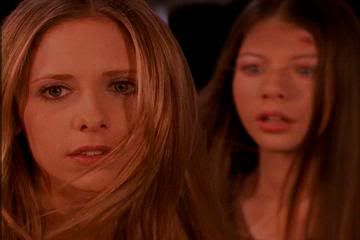
Considering her death at the end of the episode, the high quality of Season 5 as a whole, and the mixed quality of what would come after, one could argue that the series would have been better left at the end of “The Gift”.
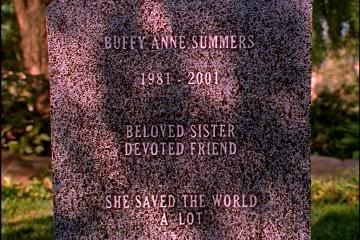
We’re halfway there! What episodes will make the final grade? What will come out on top? Will Mick actually finish it this week or will schoolwork conspire against him? Will he interrupt the Ton Ten Best of Buffy to post funny scans from Infinite Crisis or perhaps spark a Man-Thing vs. Swamp Thing debate?
Tune in tomorrow to find out!
With a quick reminder that SPOILERS can be found below, let’s jump right into spots seven, six, and five.
SEVEN: “GRADUATION DAY part 1 & 2"

Season 3, Episodes 21 & 22, Air Dates: 5/18/99 & 7/13/99
Written and Directed by Joss Whedon
Along with offering a thundering climax to Buffy’s third season and helping to set up the first season of Angel, “Graduation Day” marked the end of an era. It would be a mistake to claim that the finale marked a “jump the shark” point, but the feel of the show was never the same once its heroes graduated. There was a particular chemistry between the characters in Sunnydale High that would never be repeated (which, you know, was kind of the point).
“Graduation Day” wasn’t particularly unique among Buffy season finales, other than the number of new developments. The episode gave viewers a surprising alliance between the students of Sunnydale High, the school’s destruction, the death of Principal Snyder as well as some of the more peripheral characters, Buffy severing ties with the Watcher’s Council, a final break-up between Buffy and Angel as well as a bloody pseudo-sex scene between the two, and an equally bloody climax to the conflict between Buffy and Faith the rogue slayer.

When choosing my Top Ten, I was usually careful not to choose something simply because it featured a so-called milestone event (e.g., episodes featuring the first appearances of characters who would later be key figures in the series, episodes featuring the deaths of regular characters, etc.), but “Graduation Day” is chock full of them. The episode is all about change, after all, and the new developments were necessary to get that across.
And you can’t go wrong with two of the series’ most engaging villains: Mayor Wilkins and his protege Faith. As much as I always felt Eliza Dushku was one of the least impressive actors on the series, the conflict between Faith and Buffy was riveting regardless. Harry Groener is equally fatherly, genial, and absolutely vicious as Mayor Wilkins. He remains one of the most genuinely intimidating and enjoyable Buffy bad guys. Both characters serve as examples of how the antagonists of Buffy could engage the audience better when they were more human than demon. Few of the “Big Bads” after Wilkins/Faith succeeded as well.

SIX: “BECOMING part 1 & 2"

Season 2, Episodes 21 & 22, Air Dates: 5/12/98 & 5/19/98
Written and Directed by Joss Whedon
“Becoming” would, um, become a model for future episodes highlighting the early days of recurring vampire characters. Mixing the present story with scenes from Angel’s devilish past and the beginnings of his attempts to reconcile that past, “Becoming” gave its audience a prologue that rendered Buffy’s sacrifice of Angel that much more powerful.

The sacrifice of Angel showed how Buffy had evolved into a woman who was willing to do the unthinkable for the sake of the world and simultaneously how she could never fit into the narrow role her heroic lineage dictated, served as a metaphor for the difficulty of letting go of destructive lovers, and gave Buffy viewers one of the most heartbreaking conclusions in the series (if not in the history of television).
On a side note, “Becoming” also rid the series of Kendra the slayer. Not only did this make way for Faith, but also did away with criminally fake accents until they reared their ugly heads again in Season 7.

FIVE: “THE GIFT”

Season 5, Episode 22, Air Date: 5/22/01
Written and Directed by Joss Whedon
Never has a better episode of a TV series been made whose centerpiece was a fierce battle for the life of a character as annoying as Dawn Summers.
More than anything else, “The Gift” is a perfect example of how Whedon & co. manage to take a bunch of ridiculous elements that by all rights should never appear as anything but ridiculous and make them work. The combatants of the battle include a lovesick vampire, a Buffy decoy robot originally designed as a sex toy, and a vampire slayer battling a demon goddess with martial arts and a hammer stolen from a troll that would make mjolnir feel inadequate. Somehow, they make it work, and not just as a comedy.
Just as heartbreaking as “Becoming”, “The Gift” is something of a reflection of that earlier two-parter. As ill-equipped as she was for the viciousness required to fulfill her expected role, Buffy “rose to the challenge” when she sent Angel to hell. Finally and unequivocally unwilling to play the part that’s been forced upon her, Buffy sacrifices herself rather than even humor the possibility of again killing a loved one. It’s her final abandonment of everything she was supposed to be.

Considering her death at the end of the episode, the high quality of Season 5 as a whole, and the mixed quality of what would come after, one could argue that the series would have been better left at the end of “The Gift”.

We’re halfway there! What episodes will make the final grade? What will come out on top? Will Mick actually finish it this week or will schoolwork conspire against him? Will he interrupt the Ton Ten Best of Buffy to post funny scans from Infinite Crisis or perhaps spark a Man-Thing vs. Swamp Thing debate?
Tune in tomorrow to find out!
Labels:
Buffy the Vampire Slayer,
Television
Monday, October 17, 2005
Mick's Top Ten Best of Buffy, Part One
After the first resurrection of The Burn, I wrote about why and how I managed to fall in love with Buffy the Vampire Slayer despite the fact that I didn’t even see it until after the final episode aired. Now that I’ve watched all the episodes, recovered from the mistake that was Buffy’s final season, reviewed one of the series’ comic book adaptations, and even started mining the spin-off Angel, I figure I’m as ready as I’ll ever be to deliver my sermon on what I consider to be the Ten Best of Buffy.
WARNING: There’s no way for me to explain why these episodes deserve Top Ten treatment without giving out a SPOILER here and there. So, now you’re warned.
And so, without further preamble . . .
TEN: “SUPERSTAR”
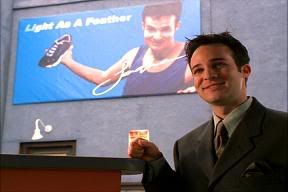
Season Four, Episode 17, Air date: 4/4/00
Written by Jane Espenson, Directed by David Grossman
Plenty of Buffy episodes deal with magic spells and curses affecting the entire population of Sunnydale. Number Ten in Mick’s Ten Best of Buffy is one of the only episodes in which not only is the spell working as soon as the episode begins, but it actually changes the opening credits.
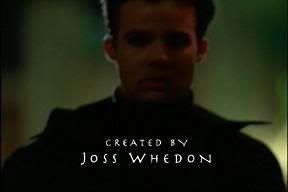
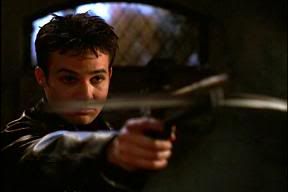
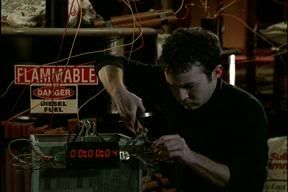
Mixed in with the credits are shots of a short, baby-faced geek brandishing crossbows, disarming time bombs, and just all-around trying and failing to appear like a mixture of James Bond and Buffy’s broody ex-boyfriend. Longtime watchers will recognize him as Jonathan, a Sunnydale High misfit who did little more than take beatings from jocks and monsters alike in the second and third seasons of the show. Before “Superstar” his only prominent appearances included a botched suicide attempt in Season 3’s “Earshot” and his presentation of a class award to Buffy later that season in “The Prom”.
Jonathan creates a whole new world in “Superstar”. Along with usurping Buffy’s position as premiere superhero of Sunnydale, in his world Jonathan starred in The Matrix, invented the Internet, produced a line of successful Big Band albums, and apparently his trumpet playing is the fire that fuels the passion of Xander and Anya’s relationship.
Besides the clever handling of the opening credits and the introduction of the spell, what I liked most about this episode was how Jonathan’s motives and actions were dealt with. While it’s clear Jonathan is the antagonist of the episode and that he wants to keep his illusion alive, he’s never depicted at being at all malicious. At worst, when Buffy begins to figure out what’s going on, he’s evasive and conflicted. When he uses his new status as confidant to both Buffy and Riley (Buffy’s Season 4 love interest), as condescending a prick as he is, he sincerely wants to help them. He’s part of something that will become a common theme in Mick’s “Ten Best Buffy”: an example that the more human Whedon & Co. rendered their bad guys, the more the characters enriched the story.
NINE: “HUSH”
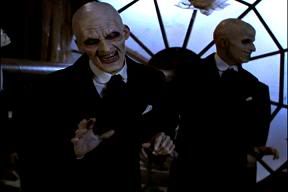
Season 4, Episode 10, Air date: 12/14/99
Written and Directed by Joss Whedon
The famous silent episode of Buffy (well, not COMPLETELY silent), “Hush” introduced fans to perhaps the creepiest villains of the series: the wordless, grinning ghouls known as The Gentlemen.
A lot is made of the silent aspect of “Hush,” and I won’t deny it’s impressive and entertaining. Perhaps my favorite scene involves Giles educating Buffy and the Scoobies on The Gentlemen while using some bloody transparencies on a projector with musical accompaniment.

But with or without dialogue, the stars of this episode are The Gentlemen. The physical aspects of monsters on Buffy tended to be adequate at best, campy at worst. It was okay, you accepted it because it was part of the show’s charm, but it was rare that the creative staff managed to design a very simple monster that was genuinely scary. The Gentlemen are such beasts. Caught in perpetual steel grins, floating a few feet above the pavement, and exchanging polite and silent niceties with each other even as they cut out a victim’s heart, The Gentleman were - without a doubt - the most bone-chillingly creepiest villains to ever go toe-to-toe with Buffy. The silent aspect of the episode, for me, was just icing on the cake.
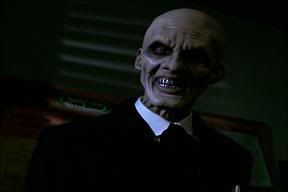
EIGHT: “RESTLESS”
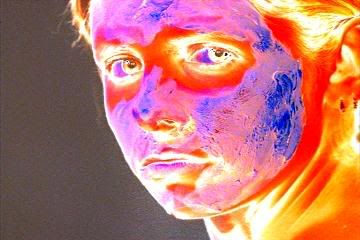
Season 4, Episode 22, Air date: 5/23/00
Written and Directed by Joss Whedon
“Restless” is unique in a lot of ways, but first and foremost it differs in that it was the Season 4 finale, and yet was the only finale of any Buffy season that didn’t feature the climax between the forces of good and evil for that particular year. Instead, it deals with a danger that arises after the Big Bad has already been vanquished.
In the previous episode, “Primeval”, Buffy defeats a demon/human cyborg named Adam by temporarily merging her spirit with those of Xander, Giles, and Willow. In “Restless”, we find that the spirit of the first Slayer was offended by the merging as she seeks to murder Buffy’s three closest allies in their dreams.
Since most of the episode features dream sequences, there’s a lot of Lynch influence here, even a blatant homage (during Willow’s dream sequence there’s an abundance of red curtain everywhere). Since I’ve never experienced a dream nearly as coherent as most dream sequences you find on TV or film, I appreciate Whedon’s commitment to nonsense throughout the episode. Characters speak ridiculous lines of dialogue that sometimes hold metaphorical gems, and other times are just a little goofy.
Visually, it’s one of the most impressive episodes of the series. Scenes jump between color and black-and-white, locales merge so that Xander’s basement apartment seems to connect to just about every other setting in the series, and perfectly dreamlike scenarios pop up like Giles and Spike on playground swings or Giles doling out his usual research instructions to Xander and Willow, except singing them as a part of a rock band at the Bronze.
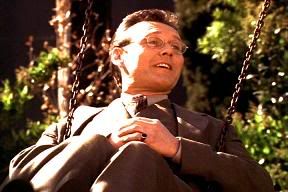
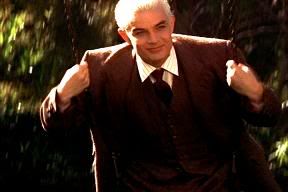
There’s also some prophesizing in the episode, some obviously intentional, some obviously not. In Buffy’s dream sequence, Tara utters the same words Dracula would speak to her in the first episode of Season 5, and follows it with “Be back before Dawn.” There’s a lot of other stuff in there, but it’s more fun to find it yourself.
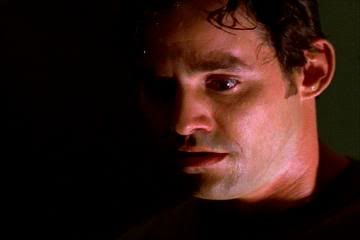
What I liked most about “Restless,” was that it was the first really sober and serious look at Xander’s character, particularly when it comes to how his situation with his parents has shaped him. It’s hinted at throughout the series, but it’s usually more of a joke than anything (usually used as fodder for Cordelia’s insults). While I know pretty much everything about Xander is treated as a joke, considering the setting (Southern California, in neighborhoods in which wallets aren’t exactly overflowing with food stamps), the “poor boy” jokes always left a bad taste in my mouth. It was one of the few aspects of Buffy that genuinely offended me, though obviously not enough to drive me away. “Restless” was the first time the surface of Xander’s relationship with his family was scratched, though unfortunately it pretty much ended there.
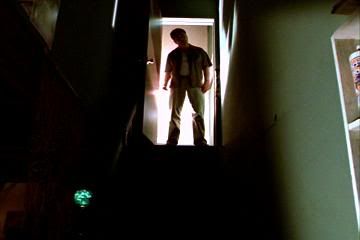
Regular Buffy watchers will no doubt notice that all three episodes making up the bottom of Mick’s Top Ten Best of Buffy are from the fourth season. This wasn’t conscious on my part, though it probably isn’t a complete accident. While I feel that overall Season 4 was one of the weakest, it saw a few of the best stand-alone shows of the series. Maybe my opinion of the season as a whole is coloring my opinion of the episodes. I can’t say for sure.
See you tomorrow for spots seven, six, and five of Mick’s Top Ten Best of Buffy!
WARNING: There’s no way for me to explain why these episodes deserve Top Ten treatment without giving out a SPOILER here and there. So, now you’re warned.
And so, without further preamble . . .
TEN: “SUPERSTAR”

Season Four, Episode 17, Air date: 4/4/00
Written by Jane Espenson, Directed by David Grossman
Plenty of Buffy episodes deal with magic spells and curses affecting the entire population of Sunnydale. Number Ten in Mick’s Ten Best of Buffy is one of the only episodes in which not only is the spell working as soon as the episode begins, but it actually changes the opening credits.



Mixed in with the credits are shots of a short, baby-faced geek brandishing crossbows, disarming time bombs, and just all-around trying and failing to appear like a mixture of James Bond and Buffy’s broody ex-boyfriend. Longtime watchers will recognize him as Jonathan, a Sunnydale High misfit who did little more than take beatings from jocks and monsters alike in the second and third seasons of the show. Before “Superstar” his only prominent appearances included a botched suicide attempt in Season 3’s “Earshot” and his presentation of a class award to Buffy later that season in “The Prom”.
Jonathan creates a whole new world in “Superstar”. Along with usurping Buffy’s position as premiere superhero of Sunnydale, in his world Jonathan starred in The Matrix, invented the Internet, produced a line of successful Big Band albums, and apparently his trumpet playing is the fire that fuels the passion of Xander and Anya’s relationship.
Besides the clever handling of the opening credits and the introduction of the spell, what I liked most about this episode was how Jonathan’s motives and actions were dealt with. While it’s clear Jonathan is the antagonist of the episode and that he wants to keep his illusion alive, he’s never depicted at being at all malicious. At worst, when Buffy begins to figure out what’s going on, he’s evasive and conflicted. When he uses his new status as confidant to both Buffy and Riley (Buffy’s Season 4 love interest), as condescending a prick as he is, he sincerely wants to help them. He’s part of something that will become a common theme in Mick’s “Ten Best Buffy”: an example that the more human Whedon & Co. rendered their bad guys, the more the characters enriched the story.
NINE: “HUSH”

Season 4, Episode 10, Air date: 12/14/99
Written and Directed by Joss Whedon
The famous silent episode of Buffy (well, not COMPLETELY silent), “Hush” introduced fans to perhaps the creepiest villains of the series: the wordless, grinning ghouls known as The Gentlemen.
A lot is made of the silent aspect of “Hush,” and I won’t deny it’s impressive and entertaining. Perhaps my favorite scene involves Giles educating Buffy and the Scoobies on The Gentlemen while using some bloody transparencies on a projector with musical accompaniment.

But with or without dialogue, the stars of this episode are The Gentlemen. The physical aspects of monsters on Buffy tended to be adequate at best, campy at worst. It was okay, you accepted it because it was part of the show’s charm, but it was rare that the creative staff managed to design a very simple monster that was genuinely scary. The Gentlemen are such beasts. Caught in perpetual steel grins, floating a few feet above the pavement, and exchanging polite and silent niceties with each other even as they cut out a victim’s heart, The Gentleman were - without a doubt - the most bone-chillingly creepiest villains to ever go toe-to-toe with Buffy. The silent aspect of the episode, for me, was just icing on the cake.

EIGHT: “RESTLESS”

Season 4, Episode 22, Air date: 5/23/00
Written and Directed by Joss Whedon
“Restless” is unique in a lot of ways, but first and foremost it differs in that it was the Season 4 finale, and yet was the only finale of any Buffy season that didn’t feature the climax between the forces of good and evil for that particular year. Instead, it deals with a danger that arises after the Big Bad has already been vanquished.
In the previous episode, “Primeval”, Buffy defeats a demon/human cyborg named Adam by temporarily merging her spirit with those of Xander, Giles, and Willow. In “Restless”, we find that the spirit of the first Slayer was offended by the merging as she seeks to murder Buffy’s three closest allies in their dreams.
Since most of the episode features dream sequences, there’s a lot of Lynch influence here, even a blatant homage (during Willow’s dream sequence there’s an abundance of red curtain everywhere). Since I’ve never experienced a dream nearly as coherent as most dream sequences you find on TV or film, I appreciate Whedon’s commitment to nonsense throughout the episode. Characters speak ridiculous lines of dialogue that sometimes hold metaphorical gems, and other times are just a little goofy.
Visually, it’s one of the most impressive episodes of the series. Scenes jump between color and black-and-white, locales merge so that Xander’s basement apartment seems to connect to just about every other setting in the series, and perfectly dreamlike scenarios pop up like Giles and Spike on playground swings or Giles doling out his usual research instructions to Xander and Willow, except singing them as a part of a rock band at the Bronze.


There’s also some prophesizing in the episode, some obviously intentional, some obviously not. In Buffy’s dream sequence, Tara utters the same words Dracula would speak to her in the first episode of Season 5, and follows it with “Be back before Dawn.” There’s a lot of other stuff in there, but it’s more fun to find it yourself.

What I liked most about “Restless,” was that it was the first really sober and serious look at Xander’s character, particularly when it comes to how his situation with his parents has shaped him. It’s hinted at throughout the series, but it’s usually more of a joke than anything (usually used as fodder for Cordelia’s insults). While I know pretty much everything about Xander is treated as a joke, considering the setting (Southern California, in neighborhoods in which wallets aren’t exactly overflowing with food stamps), the “poor boy” jokes always left a bad taste in my mouth. It was one of the few aspects of Buffy that genuinely offended me, though obviously not enough to drive me away. “Restless” was the first time the surface of Xander’s relationship with his family was scratched, though unfortunately it pretty much ended there.

Regular Buffy watchers will no doubt notice that all three episodes making up the bottom of Mick’s Top Ten Best of Buffy are from the fourth season. This wasn’t conscious on my part, though it probably isn’t a complete accident. While I feel that overall Season 4 was one of the weakest, it saw a few of the best stand-alone shows of the series. Maybe my opinion of the season as a whole is coloring my opinion of the episodes. I can’t say for sure.
See you tomorrow for spots seven, six, and five of Mick’s Top Ten Best of Buffy!
Labels:
Buffy the Vampire Slayer,
Television
Subscribe to:
Posts (Atom)
